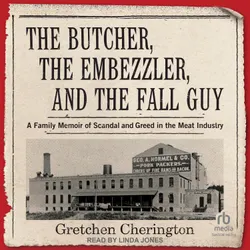Three powerful men converge on the banks of the Red Cedar River in the early 1900s in southern Minnesota—George Albert Hormel, founder of what will become the $10 billion food conglomerate Hormel Foods; Alpha LaRue Eberhart, the author’s paternal grandfather and Hormel’s Executive Vice President and Corporate Secretary; and Ransome Josiah Thomson, Hormel’s comptroller. Over ten years, Thomson will embezzle $1.2 million from the company’s coffers, nearly bringing the company to its knees.
The Butcher, The Embezzler, and The Fall Guy opens in 1922 as George Hormel calls Eberhart into his office and demands his resignation. Hailed as the true leader of the company he’d helped Hormel build—is Eberhart complicit in the embezzlement? Far worse than losing his job and the great wealth he’d rightfully accumulated is that his beloved young wife, Lena, is dying while their three children grieve alongside. Of course, his story doesn’t end there.
In scale both intimate and grand, Cherington deftly weaves the histories of Hormel, Eberhart, and Thomson within the sweeping landscape of our country’s early industries, along with keen observations about business leaders gleaned from her thirty-five-year career advising top company executives. The Butcher, The Embezzler, and The Fall Guy equally chronicles Cherington’s journey from blind faith in family lore to a nuanced consideration of the three men’s great strengths and flaws—and a multilayered, thoughtful exploration of the ways we all must contend with the mythology of powerful men, our reverence for heroes, and the legacy of a complicated past.



